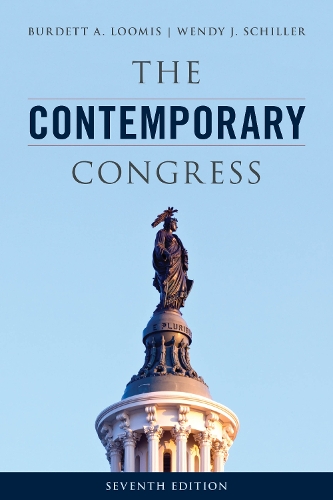
The Contemporary Congress
(Paperback, Seventh Edition)
Publishing Details
The Contemporary Congress
By (Author) Burdett A. Loomis
By (author) Wendy J. Schiller
Bloomsbury Publishing PLC
Rowman & Littlefield Publishers
15th January 2018
Seventh Edition
United States
Classifications
Tertiary Education
Non Fiction
Political parties and party platforms
328.73
Physical Properties
Paperback
256
Width 150mm, Height 231mm, Spine 11mm
313g
Description
In an era of heightened partisanship and increased polarization, The Contemporary Congressoffers a clear and concise introduction to legislative processes. Perfect as a brief core or supplementary text for undergraduate courses, Loomis and Schiller construct a comprehensive portrait of the U.S. Congress, from defining congressional structures and procedures, to outlining the process of elections, and analyzing presidential-congressional relations. The seventh edition focuses on two parallel trends: an increasingly partisan and polarized Congress, and a growing executive power. In addition, the authors make some early observations of relations between the Congress and the Trump Administration. New coverage includes the art of electioneering, the pressures of campaign fundraising, and updated policy goals of the political parties that shape the congressional agenda. From a late night deciding vote by Senator John McCain (R-AZ), to the rise and fall of Freedom Caucus member Representative Tim Huelskamp (R-KS), a new Spotlight feature provides brief case studies of decisions made by individual members to illustrate the constant balance that they must strike between their party and their constituents, and what happens when they get that balance wrong.
Reviews
Any serious student in American politics, institutions, and democracy should read Loomis and Schillers Contemporary Congress. The text offers the historic framework of Congress strength and power through decades of dramatic change in the 20th-21st centuries. -- Ravi K. Perry, Virginia Commonwealth University
A narrative rich text that is filled with interesting stories about Congress and exceptionally well written; likely the most student-friendly Congress text that I have encountered. -- Michael S. Lynch, University of Georgia
For a brief but sophisticated overview of Congress, this book cannot be beat. The authors have included all of the essential information for an understanding of how Congress works. -- Charles Bullock, University of Georgia
Author Bio
Burdett Loomis is a professor of political science at the University of Kansas, where he has taught since 1979. He has written extensively on Congress, interest groups, and state politics, including his edited book, The U.S. Senate: From Deliberation to Dysfunction. He served as an American Political Science Association Congressional Fellow with Rep. Paul Simon (D-IL), and founded KUs Washington intern program in 1983 and continues as its director. He is currently working on studies of Rep. Bob Michel and Sen Bob Dole, along with a book on Kansas politics over the past fifty years. Wendy J. Schiller is professor of political science at Brown University where she has taught since 1994. Before receiving her PhD from the University of Rochester, Schiller served on the staffs of the Senator Daniel Patrick Moynihan and Governor Mario Cuomo. She has written extensively on the United States Senate, including her book Partners and Rivals: Representation in U.S. Senate Delegations, and Electing the Senate: Indirect Democracy before the Seventeenth Amendment. She is currently working on the effects of federalism on gender equality and human security across states. Schiller also provides political commentary on legislative politics to local and national news outlets.
